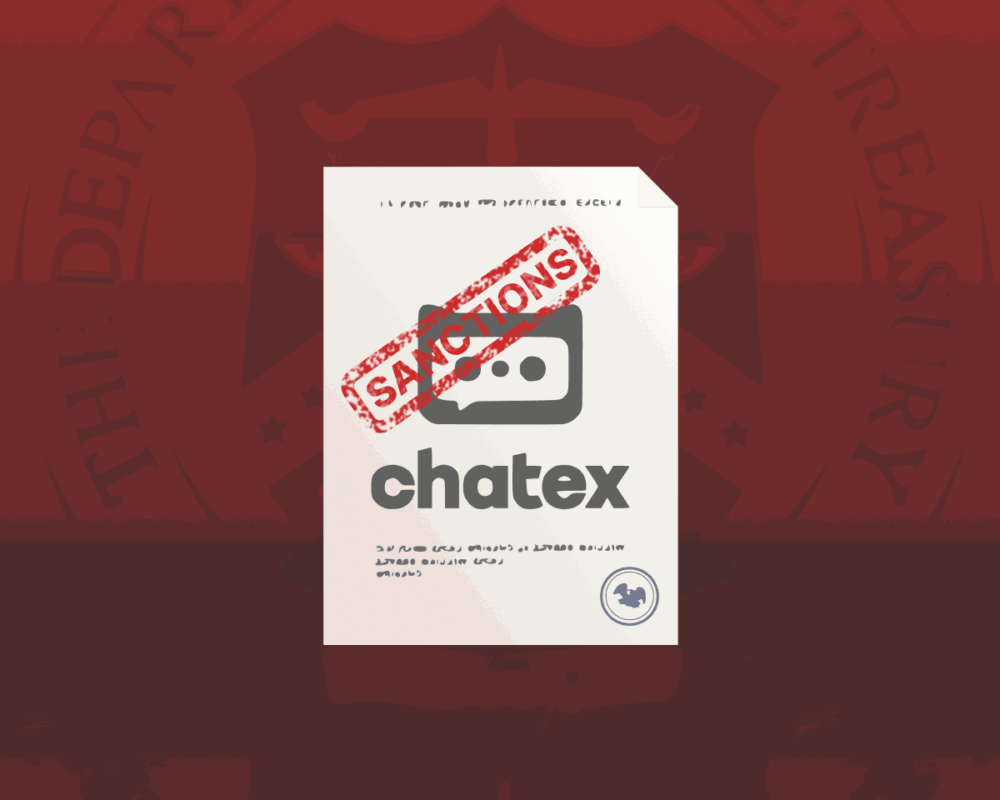Chatex Bitcoin Exchange Added to US Sanctions List
The US Department of the Treasury and the Department of Justice have added the Telegram-based cryptocurrency exchange bot Chatex, along with its affiliated companies Izibits OÜ, Chatextech SIA, and Hightrade Finance Ltd., to the sanctions list.
According to the Office of Foreign Assets Control (OFAC), more than half of Chatex’s confirmed transactions are directly linked to illegal or high-risk activities, particularly those involving ransomware operators. OFAC also noted a direct connection between Chatex and the Russian exchange Suex, which was sanctioned at the end of September. Both companies share a co-founder, Russian national Egor Petukhovsky.
“Chatex was added to the sanctions list for providing material support to Suex and for the threat posed by criminal ransomware programs. The companies Izibits OÜ, Chatextech SIA, and Hightrade Finance Ltd. provided material support to Chatex and supplied the infrastructure for the exchange’s operations,” the agency stated.
Analytics firm Chainalysis found that since September 2018, Chatex processed at least $77.5 million in Bitcoin transactions, including over $17 million in illicit assets. These included funds from the darknet marketplace Hydra, scam projects like Finiko and QubitTech.ai, and several ransomware operators.
The sanctions list includes 30 Chatex cryptocurrency addresses across the Bitcoin, Ethereum, Tether, and Ripple networks.
Regulatory Actions Against Chatex and Affiliates
Chatex is owned and operated by Izibits OÜ. The Estonian Financial Intelligence Unit has already revoked its virtual asset service provider license. Latvian authorities have suspended Chatextech SIA’s operations and fined the company for violations of business registration and operation laws. Hightrade Finance Ltd., registered in Saint Vincent, is mentioned as a legal entity in Chatex’s user agreement.
Sanctions on Individuals Linked to Ransomware
Sanctions were also imposed on Russian national Evgeny Polyanin and Ukrainian national Yaroslav Vasinsky, who are accused of collaborating with the Sodinokibi/REvil group. According to authorities, Vasinsky participated in attacks on at least nine US companies, including software developer Kaseya in July 2021. Vasinsky was arrested in Poland, where authorities seized $6.1 million in Bitcoin from him. He is currently awaiting extradition to the US.
Polyanin’s company, accused of extorting US government agencies and private sector companies, was also added to the OFAC list. The FBI has placed Polyanin on its wanted list, and US authorities believe he is in Barnaul, Russia.
Polyanin’s sanctioned addresses received over $11.5 million in Bitcoin and more than $2 million in USDT. Vasinsky’s Bitcoin wallets processed transactions totaling over $900,000.
The US State Department has offered a $10 million reward for information leading to the arrest of leaders of the Sodinokibi/REvil group.
Implications of the Sanctions
OFAC has blocked any property belonging to the listed individuals and entities within US jurisdiction. US residents and citizens are prohibited from conducting business with them under threat of fines or imprisonment.
ForkLog has requested comments from Chatex representatives.
Background: Previous Sanctions on Suex
On September 21, the US Treasury added Suex and its website, along with 25 related addresses in the Bitcoin, Ethereum, and Tether networks, to the sanctions list. The Treasury claims that Suex processed funds from operators of at least eight ransomware programs, scam projects, darknet marketplaces, and the now-defunct BTC-e exchange. Among other transactions, Suex processed several million dollars for the WEX exchange.
Analysts involved in the investigation estimated that up to 40% of Suex’s turnover was linked to cybercriminal assets. During the legal proceedings against Suex, Egor Petukhovsky withdrew from his roles as a shareholder and employee of Chatex. He denied any involvement of the company in illegal activities.



